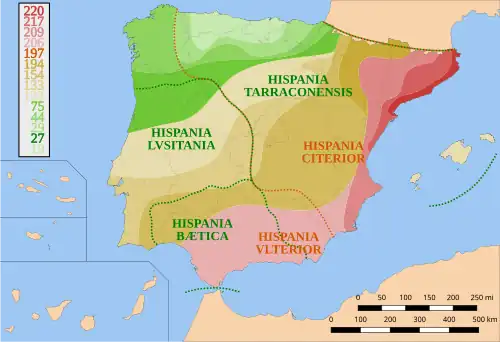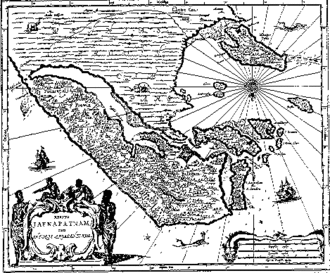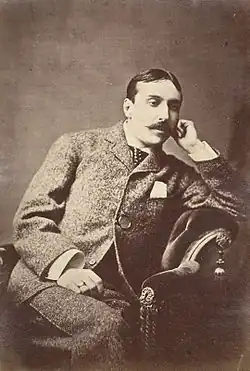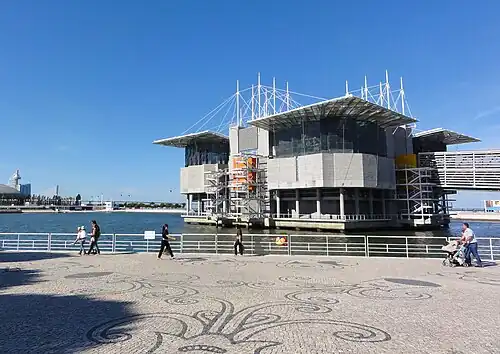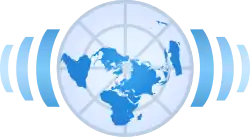Portal:Portugal
Welcome to the Portugal portal.svg.png) 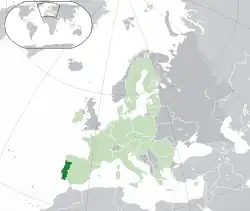 Portugal, officially the Portuguese Republic, is a country on the Iberian Peninsula in Southwestern Europe. Featuring the westernmost point in continental Europe, Portugal borders Spain to its north and east, with which it shares the longest uninterrupted border in the European Union; to the south and the west is the North Atlantic Ocean; and to the west and southwest lie the Macaronesian archipelagos of the Azores and Madeira, which are the two autonomous regions of Portugal. Lisbon is the capital and largest city, followed by Porto, which is the only other metropolitan area. The western Iberian Peninsula has been continuously inhabited since prehistoric times, with the earliest signs of settlement dating to 5500 BC. Celtic and Iberian peoples arrived in the first millennium BC. The region came under Roman control in the second century BC. A succession of Germanic peoples and the Alans ruled from the fifth to eighth centuries AD. Muslims invaded mainland Portugal in the eighth century, but were gradually expelled by the Christian Reconquista, culminating with the capture of the Algarve between 1238 and 1249. Modern Portugal began taking shape during this period, initially as a county of the Christian Kingdom of León in 868, and formally as a sovereign kingdom with the Manifestis Probatum in 1179. As one of the earliest participants in the Age of Discovery, Portugal made several seminal advancements in nautical science. The Portuguese subsequently were among the first Europeans to explore and discover new territories and sea routes, establishing a maritime empire of settlements, colonies, and trading posts that extended mostly along the South Atlantic and Indian Ocean coasts. A dynastic crisis in the early 1580s resulted in the Iberian Union (1580–1640), which unified Portugal under Spanish rule, marking its gradual decline as a global power. Portuguese sovereignty was regained in 1640 and was followed by a costly and protracted war lasting until 1688, while the 1755 Lisbon earthquake destroyed the city and further damaged the empire's economy. (Full article...) Selected article -EDP Lisbon Half Marathon is an annual international half marathon competition which is contested every March in Lisbon, Portugal. It carries IAAF Gold Label Road Race status. The men's course record of 57:31 was set by Jacob Kiplimo in 2021, which was the world record for the half marathon distance until 2024. Kenyan runners have been very successful in the competition, accounting for over half of the total winners, with Tegla Loroupe taking the honours in the women's race on six separate occasions. The Lisbon Half Marathon is not to be confused with Luso Portugal Half Marathon, another prominent half marathon race which is also held in Lisbon in October. (Full article...)
|
| This is a list of recognized content, updated weekly by JL-Bot (talk · contribs) (typically on Saturdays). There is no need to edit the list yourself. If an article is missing from the list, make sure it is tagged (e.g. {{WikiProject Portugal}}) or categorized correctly and wait for the next update. See WP:RECOG for configuration options. |
Featured articles
Former featured articles
Featured lists
Former featured lists
Good articles
 1909 Benavente earthquake
1909 Benavente earthquake 1967 European Cup final
1967 European Cup final 1980 Azores Islands earthquake
1980 Azores Islands earthquake 1986 enlargement of the European Communities
1986 enlargement of the European Communities 1999–2000 S.L. Benfica season
1999–2000 S.L. Benfica season 2000–01 S.L. Benfica season
2000–01 S.L. Benfica season 2001–02 S.L. Benfica season
2001–02 S.L. Benfica season 2002–03 S.L. Benfica season
2002–03 S.L. Benfica season 2003–04 S.L. Benfica season
2003–04 S.L. Benfica season 2004–05 S.L. Benfica season
2004–05 S.L. Benfica season 2005–06 S.L. Benfica season
2005–06 S.L. Benfica season 2006–07 S.L. Benfica season
2006–07 S.L. Benfica season 2007–08 S.L. Benfica season
2007–08 S.L. Benfica season 2008–09 S.L. Benfica season
2008–09 S.L. Benfica season Afonso Henriques Theatre
Afonso Henriques Theatre Afraflacilla tarajalis
Afraflacilla tarajalis Aliqoli Jadid-ol-Eslam
Aliqoli Jadid-ol-Eslam Amar pelos dois
Amar pelos dois Fernão Pires de Andrade
Fernão Pires de Andrade Caldas da Rainha
Caldas da Rainha Hurricane Epsilon (2020)
Hurricane Epsilon (2020) Flavius Paulus
Flavius Paulus Naide Gomes
Naide Gomes The Head Hunter (2018 film)
The Head Hunter (2018 film) History of Bombay under Portuguese rule (1534–1661)
History of Bombay under Portuguese rule (1534–1661) Hypericum foliosum
Hypericum foliosum Hypericum grandifolium
Hypericum grandifolium Kerry slug
Kerry slug Lope Martín
Lope Martín Roderigo Lopes
Roderigo Lopes Lusitano
Lusitano Gaius Marius
Gaius Marius Marmalade
Marmalade Disappearance of Madeleine McCann
Disappearance of Madeleine McCann Mediterranean campaign of 1798
Mediterranean campaign of 1798 Nuno Mendes (footballer, born 1978)
Nuno Mendes (footballer, born 1978) Nani (footballer)
Nani (footballer) Neanderthal
Neanderthal Battle of Orthez
Battle of Orthez Pocinho railway station
Pocinho railway station Portugal at the 1952 Winter Olympics
Portugal at the 1952 Winter Olympics Portugal at the 2006 Winter Olympics
Portugal at the 2006 Winter Olympics Portugal at the 2010 Winter Olympics
Portugal at the 2010 Winter Olympics Portuguese conquest of the Jaffna kingdom
Portuguese conquest of the Jaffna kingdom Battle of Quifangondo
Battle of Quifangondo Cuca Roseta
Cuca Roseta S.L. Benfica in international football
S.L. Benfica in international football Siege of the Salamanca forts
Siege of the Salamanca forts Santos Passos Church
Santos Passos Church Siege of Malacca (1641)
Siege of Malacca (1641) Silence (2016 film)
Silence (2016 film) Timor-Leste
Timor-Leste Portuguese ironclad Vasco da Gama
Portuguese ironclad Vasco da Gama Subtropical Storm Alpha (2020)
Subtropical Storm Alpha (2020)
Former good articles
Did you know? articles
 1937 dispute between Czechoslovakia and Portugal
1937 dispute between Czechoslovakia and Portugal 1980 Azores Islands earthquake
1980 Azores Islands earthquake 1986 enlargement of the European Communities
1986 enlargement of the European Communities 2005 Azores subtropical storm
2005 Azores subtropical storm 2011 Portuguese legislative election
2011 Portuguese legislative election Abada (rhinoceros)
Abada (rhinoceros) Abbasid–Carolingian alliance
Abbasid–Carolingian alliance Snu Abecassis
Snu Abecassis Afonso Henriques Theatre
Afonso Henriques Theatre Águas Livres Aqueduct
Águas Livres Aqueduct Ala-Arriba! (film)
Ala-Arriba! (film) Alcobaça Monastery
Alcobaça Monastery Aldeadávila Dam
Aldeadávila Dam Jim Aldred
Jim Aldred Alfonsine Ordinances
Alfonsine Ordinances Almond Blossom Cross Country
Almond Blossom Cross Country Alto River
Alto River Francisco D'Andrade
Francisco D'Andrade Angolan War of Independence
Angolan War of Independence 1933 anti-Nazi boycott
1933 anti-Nazi boycott Melissa Antunes
Melissa Antunes Architecture of Póvoa de Varzim
Architecture of Póvoa de Varzim Baguia Fort
Baguia Fort João Barrento
João Barrento Francisco Barreto
Francisco Barreto Battle of Chaul
Battle of Chaul Battle of Salt River
Battle of Salt River Mónica Bettencourt-Dias
Mónica Bettencourt-Dias Diogo de Boitaca
Diogo de Boitaca Botanical Garden of Faial
Botanical Garden of Faial Anabela Braz Pires
Anabela Braz Pires Buçaco Forest
Buçaco Forest Cacela Velha
Cacela Velha Alberto Caeiro
Alberto Caeiro Celeste Caeiro
Celeste Caeiro Gabriela Canavilhas
Gabriela Canavilhas Capture of Malacca (1511)
Capture of Malacca (1511) Carcavelos
Carcavelos Carmo Convent
Carmo Convent Carrapateira, Aljezur
Carrapateira, Aljezur Rodrigo de Castro Pereira
Rodrigo de Castro Pereira Chiado
Chiado Church of Saint Ildefonso
Church of Saint Ildefonso Churchill's Port
Churchill's Port Cividade de Terroso
Cividade de Terroso Judith R. Cohen
Judith R. Cohen Colloquies on the Simples and Drugs of India
Colloquies on the Simples and Drugs of India Isabella Correa
Isabella Correa Gonçalo Teixeira Correia
Gonçalo Teixeira Correia Carlos Eugénio Correia da Silva, Count of Paço de Arcos
Carlos Eugénio Correia da Silva, Count of Paço de Arcos Cão de Gado Transmontano
Cão de Gado Transmontano Sylvester da Cunha
Sylvester da Cunha Sisnando Davides
Sisnando Davides Desfado
Desfado Albertina Dias
Albertina Dias Jorge Dias
Jorge Dias Margot Dias
Margot Dias Dictionarium Annamiticum Lusitanum et Latinum
Dictionarium Annamiticum Lusitanum et Latinum Dragon's Tail (peninsula)
Dragon's Tail (peninsula) Dudum siquidem
Dudum siquidem Dum Diversas
Dum Diversas E depois do adeus
E depois do adeus East Timorese civil war
East Timorese civil war Eccentricities of a Blonde-Haired Girl
Eccentricities of a Blonde-Haired Girl Embassy of Portugal, Bangkok
Embassy of Portugal, Bangkok Factory House
Factory House Gerald the Fearless
Gerald the Fearless Ferdinand the Holy Prince
Ferdinand the Holy Prince Mateus Fernandes (architect)
Mateus Fernandes (architect) Diogo Fernandes Pereira
Diogo Fernandes Pereira Rúben Fernandes
Rúben Fernandes Odette Ferreira
Odette Ferreira Matilde Fidalgo
Matilde Fidalgo Football Leaks
Football Leaks Battle of Fukuda Bay
Battle of Fukuda Bay Funicular dos Guindais
Funicular dos Guindais Siege of Galle (1640)
Siege of Galle (1640) Battle of the Gebora
Battle of the Gebora General Confederation of Labour (Portugal)
General Confederation of Labour (Portugal) Goa liberation movement
Goa liberation movement Bento de Góis
Bento de Góis Naide Gomes
Naide Gomes Government Palace, Dili
Government Palace, Dili Gruta das Torres
Gruta das Torres Henrique Henriques
Henrique Henriques Hermeric
Hermeric History of Portuguese wine
History of Portuguese wine Hospital Real de Todos-os-Santos
Hospital Real de Todos-os-Santos Hypericum foliosum
Hypericum foliosum Hypericum grandifolium
Hypericum grandifolium Iberian Pyrite Belt
Iberian Pyrite Belt Iberian orca attacks
Iberian orca attacks Iberian ribbed newt
Iberian ribbed newt João das Regras
João das Regras Kandyan commerce raiding against Portugal (1612–1613)
Kandyan commerce raiding against Portugal (1612–1613) Henry Koster (author)
Henry Koster (author) Lighthouse of Ponta das Contendas
Lighthouse of Ponta das Contendas Lisbon Half Marathon
Lisbon Half Marathon Lope Martín
Lope Martín Aaron Lopez
Aaron Lopez Treaty of the Three Black Eagles
Treaty of the Three Black Eagles Battle of Macau
Battle of Macau Robert Machin
Robert Machin Palace of Mafra
Palace of Mafra Maria Luísa de Sousa Holstein, 3rd Duchess of Palmela
Maria Luísa de Sousa Holstein, 3rd Duchess of Palmela Frederico Marques
Frederico Marques Francisco Mascarenhas (Governor of Macau)
Francisco Mascarenhas (Governor of Macau) Masseira
Masseira Mattancherry Palace
Mattancherry Palace Mazagran (drink)
Mazagran (drink) André Furtado de Mendonça
André Furtado de Mendonça Mercenary War
Mercenary War O meu coração não tem cor
O meu coração não tem cor Monastery of Santa Clara-a-Velha
Monastery of Santa Clara-a-Velha Monastery of Serra do Pilar
Monastery of Serra do Pilar Hugo Moutinho
Hugo Moutinho Luís da Silva Mouzinho de Albuquerque
Luís da Silva Mouzinho de Albuquerque National Coach Museum
National Coach Museum Neanderthal
Neanderthal New Portuguese Letters
New Portuguese Letters Nossa Senhora da Graça incident
Nossa Senhora da Graça incident Josefa de Óbidos
Josefa de Óbidos Oppas
Oppas Anglo-Persian capture of Hormuz
Anglo-Persian capture of Hormuz Palácio de Ferro
Palácio de Ferro Palácio de Lahane
Palácio de Lahane Bernardo Peres da Silva
Bernardo Peres da Silva Rafael Perestrello
Rafael Perestrello El Piñal
El Piñal Manuel Pinho
Manuel Pinho Rui Pinto
Rui Pinto Tomé Pires
Tomé Pires Pocinho railway station
Pocinho railway station Poème sur le désastre de Lisbonne
Poème sur le désastre de Lisbonne Port of Póvoa de Varzim
Port of Póvoa de Varzim Portugal in the Eurovision Song Contest 2008
Portugal in the Eurovision Song Contest 2008 Mamluk–Portuguese conflicts
Mamluk–Portuguese conflicts Portuguese Socialist Party
Portuguese Socialist Party Portuguese conquest of Goa
Portuguese conquest of Goa Portuguese conquest of Hormuz
Portuguese conquest of Hormuz Portuguese conquest of the Jaffna kingdom
Portuguese conquest of the Jaffna kingdom Portuguese invasion of the Jaffna kingdom (1560)
Portuguese invasion of the Jaffna kingdom (1560) Portuguese invasion of the Jaffna kingdom (1591)
Portuguese invasion of the Jaffna kingdom (1591) Portuguese settlement in Chittagong
Portuguese settlement in Chittagong Postage stamps and postal history of the Niassa Company
Postage stamps and postal history of the Niassa Company Praça do Almada
Praça do Almada Punic Wars
Punic Wars Pyrenean desman
Pyrenean desman Jácome Ratton
Jácome Ratton Luiz Francisco Rebello
Luiz Francisco Rebello Rechiar
Rechiar Rhodesian mission in Lisbon
Rhodesian mission in Lisbon Ribeira Palace
Ribeira Palace Aurora Rodrigues
Aurora Rodrigues Roman Temple of Évora
Roman Temple of Évora Cuca Roseta
Cuca Roseta S.C. Braga in European football
S.C. Braga in European football Battle of Sabugal
Battle of Sabugal Church of Saint Francis, Kochi
Church of Saint Francis, Kochi Sanctuary of Bom Jesus do Monte
Sanctuary of Bom Jesus do Monte Aníbal dos Santos
Aníbal dos Santos Santos Passos Church
Santos Passos Church São Bartolomeu dos Galegos
São Bartolomeu dos Galegos São José Paquete Africa
São José Paquete Africa Saptagram
Saptagram São Schlumberger
São Schlumberger John Scolvus
John Scolvus Sedlo Seamount
Sedlo Seamount Church of Our Lady of Sorrows, Póvoa de Varzim
Church of Our Lady of Sorrows, Póvoa de Varzim Francisco Serrão
Francisco Serrão Siege of Cannanore (1507)
Siege of Cannanore (1507) Siege of Diu (1538)
Siege of Diu (1538) Siege of Malacca (1641)
Siege of Malacca (1641) Siglas poveiras
Siglas poveiras José Alves Correia da Silva
José Alves Correia da Silva Sino-Portuguese Joint Declaration
Sino-Portuguese Joint Declaration Carmen Souza
Carmen Souza Symington Family Estates
Symington Family Estates Terra Chã
Terra Chã Timor-Leste
Timor-Leste Nicolau Tolentino de Almeida
Nicolau Tolentino de Almeida Topo Islet
Topo Islet Tricana poveira
Tricana poveira Orlanda Velez Isidro
Orlanda Velez Isidro Voice of Freedom (radio station)
Voice of Freedom (radio station) Wallada bint al-Mustakfi
Wallada bint al-Mustakfi War of the Castilian Succession
War of the Castilian Succession Water supply and sanitation in Portugal
Water supply and sanitation in Portugal
Featured pictures
-
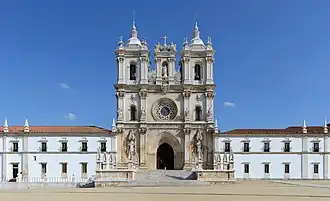 Alcobaça October 2021-1
Alcobaça October 2021-1 -
.jpg) Amalia Rodrigues, Bestanddeelnr 922-1813 (cropped)
Amalia Rodrigues, Bestanddeelnr 922-1813 (cropped) -
%252C_Parque_natural_de_la_Arr%C3%A1bida%252C_Portugal%252C_2020-07-21%252C_DD_07.jpg) Anémona de mar común (Anemonia viridis), Parque natural de la Arrábida, Portugal, 2020-07-21, DD 07
Anémona de mar común (Anemonia viridis), Parque natural de la Arrábida, Portugal, 2020-07-21, DD 07 -
%252C_Parque_natural_de_la_Arr%C3%A1bida%252C_Portugal%252C_2022-07-20%252C_DD_49.jpg) Anémona incrustante amarilla (Parazoanthus axinellae), Parque natural de la Arrábida, Portugal, 2022-07-20, DD 49
Anémona incrustante amarilla (Parazoanthus axinellae), Parque natural de la Arrábida, Portugal, 2022-07-20, DD 49 -
 Argiope July 2012-3
Argiope July 2012-3 -
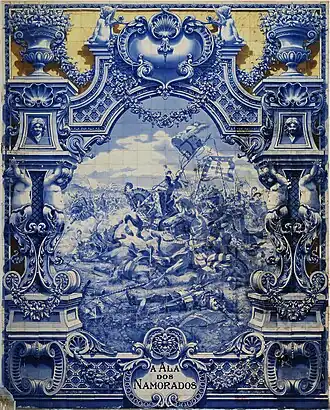 Azulejos Parque Eduardo VII-2
Azulejos Parque Eduardo VII-2 -
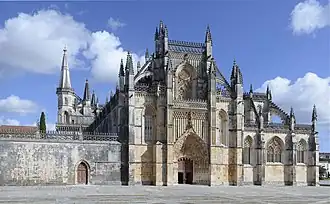 Batalha September 2021-2
Batalha September 2021-2 -
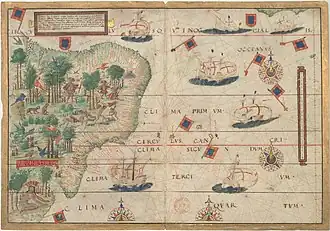 Brazil 16thc map
Brazil 16thc map -
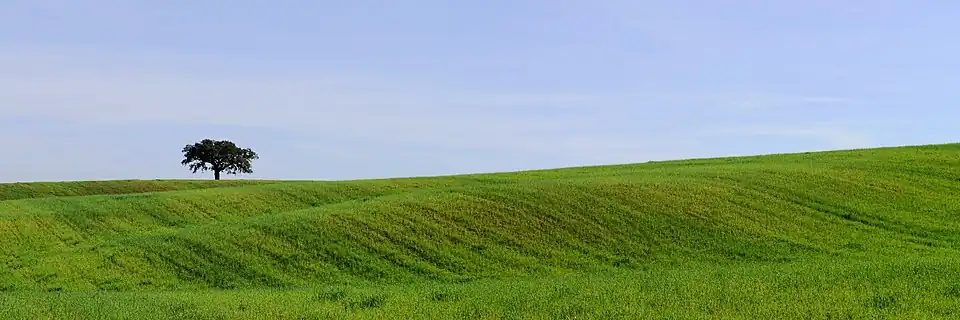 Campilhas March 2015-1a
Campilhas March 2015-1a -
.jpg) Carmen Miranda in That Night in Rio (1941)
Carmen Miranda in That Night in Rio (1941) -
 CastleSaintGeorge
CastleSaintGeorge -
 Dragonfly Porto Covo August 2021-4
Dragonfly Porto Covo August 2021-4 -
%252C_Madeira%252C_Portugal%252C_2019-05-31%252C_DD_40.jpg) Erizo de mar violáceo (Sphaerechinus granularis), Madeira, Portugal, 2019-05-31, DD 40
Erizo de mar violáceo (Sphaerechinus granularis), Madeira, Portugal, 2019-05-31, DD 40 -
%252C_Parque_natural_de_la_Arr%C3%A1bida%252C_Portugal%252C_2020-07-23%252C_DD_43.jpg) Espirógrafo (Bispira volutacornis), Parque natural de la Arrábida, Portugal, 2020-07-23, DD 43
Espirógrafo (Bispira volutacornis), Parque natural de la Arrábida, Portugal, 2020-07-23, DD 43 -
%252C_Parque_natural_de_la_Arr%C3%A1bida%252C_Portugal%252C_2020-07-23%252C_DD_70.jpg) Espirógrafo (Sabella spallanzanii), Parque natural de la Arrábida, Portugal, 2020-07-23, DD 70
Espirógrafo (Sabella spallanzanii), Parque natural de la Arrábida, Portugal, 2020-07-23, DD 70 -
%252C_Parque_natural_de_la_Arr%C3%A1bida%252C_Portugal%252C_2020-07-31%252C_DD_79.jpg) Estrella roja del Mediterráneo (Echinaster sepositus), Parque natural de la Arrábida, Portugal, 2020-07-31, DD 79
Estrella roja del Mediterráneo (Echinaster sepositus), Parque natural de la Arrábida, Portugal, 2020-07-31, DD 79 -
%252C_Parque_natural_de_la_Arr%C3%A1bida%252C_Portugal%252C_2022-07-29%252C_DD_43.jpg) Faneca (Trisopterus luscus), Parque natural de la Arrábida, Portugal, 2022-07-29, DD 43
Faneca (Trisopterus luscus), Parque natural de la Arrábida, Portugal, 2022-07-29, DD 43 -
%252C_Madeira%252C_Portugal%252C_2019-05-31%252C_DD_45.jpg) Gusano de fuego (Hermodice carunculata), Madeira, Portugal, 2019-05-31, DD 45
Gusano de fuego (Hermodice carunculata), Madeira, Portugal, 2019-05-31, DD 45 -
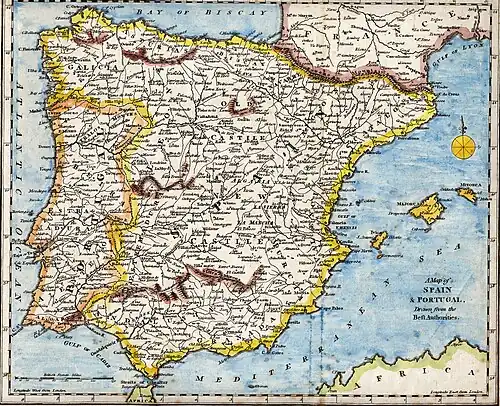 Iberian Peninsula antique map
Iberian Peninsula antique map -
Iglesia de San Ildefonso, Oporto, Portugal, 2012-05-09, DD 01
-
 Lagoa do Capitão com montanha do pico
Lagoa do Capitão com montanha do pico -
_male_underside.jpg) Lang's short tail blue (Leptotes pirithous) male underside
Lang's short tail blue (Leptotes pirithous) male underside -
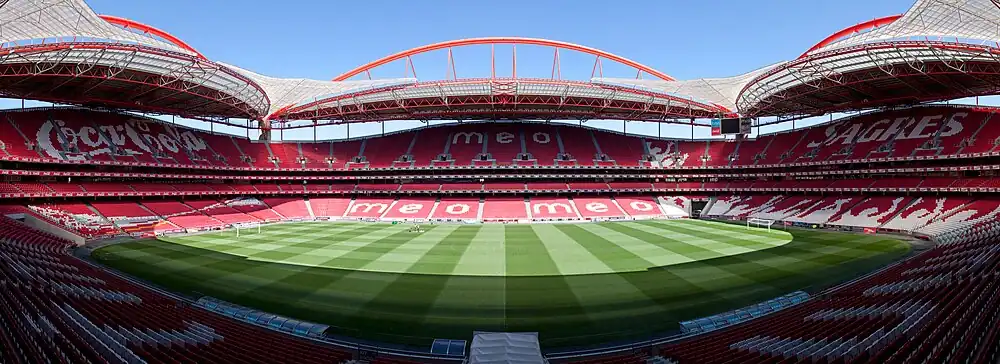 LuzLissabon
LuzLissabon -
.jpg) Marcelo Rebelo de Sousa (Web Summit)
Marcelo Rebelo de Sousa (Web Summit) -
_-_Google_Cultural_Institute.jpg) Maria I, Queen of Portugal - Giuseppe Troni, atribuído (Turim, 1739-Lisboa, 1810) - Google Cultural Institute
Maria I, Queen of Portugal - Giuseppe Troni, atribuído (Turim, 1739-Lisboa, 1810) - Google Cultural Institute -
 Maria Isabel of Portugal in front of the Prado in 1829 by Bernardo López y piquer
Maria Isabel of Portugal in front of the Prado in 1829 by Bernardo López y piquer -
%252C_Parque_natural_de_la_Arr%C3%A1bida%252C_Portugal%252C_2022-07-20%252C_DD_29.jpg) Moma amarilla (Tripterygion delaisi), Parque natural de la Arrábida, Portugal, 2022-07-20, DD 29
Moma amarilla (Tripterygion delaisi), Parque natural de la Arrábida, Portugal, 2022-07-20, DD 29 -
%252C_Parque_natural_de_la_Arr%C3%A1bida%252C_Portugal%252C_2022-07-29%252C_DD_32.jpg) Moma amarilla (Tripterygion delaisi), Parque natural de la Arrábida, Portugal, 2022-07-29, DD 32
Moma amarilla (Tripterygion delaisi), Parque natural de la Arrábida, Portugal, 2022-07-29, DD 32 -
.jpg) Nicolaes Visscher - Pharnambuci (Pernambuco, Brazil)
Nicolaes Visscher - Pharnambuci (Pernambuco, Brazil) -
.jpg) POR-4-Imperial Treasury-2400 Reis (1798-99)
POR-4-Imperial Treasury-2400 Reis (1798-99) -
%252C_Parque_natural_de_la_Arr%C3%A1bida%252C_Portugal%252C_2020-07-23%252C_DD_24.jpg) Pez ballesta (Balistes capriscus), Parque natural de la Arrábida, Portugal, 2020-07-23, DD 24
Pez ballesta (Balistes capriscus), Parque natural de la Arrábida, Portugal, 2020-07-23, DD 24 -
 Philip IV of Spain - Velázquez 1644
Philip IV of Spain - Velázquez 1644 -
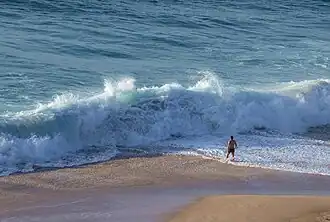 Porto Covo Outubro 2014-3
Porto Covo Outubro 2014-3 -
 Porto Covo pano April 2009-4
Porto Covo pano April 2009-4 -
 Porto3flat-cc-contr-oliv1002 edit2
Porto3flat-cc-contr-oliv1002 edit2 -
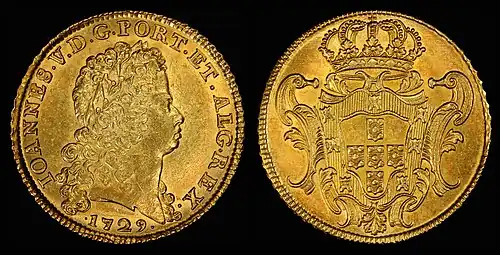 Portugal 1729 8 Escudos
Portugal 1729 8 Escudos -
Puente Don Luis I, Oporto, Portugal, 2012-05-09, DD 13
-
%252C_Parque_natural_de_la_Arr%C3%A1bida%252C_Portugal%252C_2020-07-21%252C_DD_59.jpg) Salmonete de roca (Mullus surmuletus), Parque natural de la Arrábida, Portugal, 2020-07-21, DD 59
Salmonete de roca (Mullus surmuletus), Parque natural de la Arrábida, Portugal, 2020-07-21, DD 59 -
%252C_Parque_natural_de_la_Arr%C3%A1bida%252C_Portugal%252C_2020-07-21%252C_DD_62.jpg) Sepia común (Sepia officinalis), Parque natural de la Arrábida, Portugal, 2020-07-21, DD 62
Sepia común (Sepia officinalis), Parque natural de la Arrábida, Portugal, 2020-07-21, DD 62 -
 Sintra Portugal Palácio da Pena-01
Sintra Portugal Palácio da Pena-01 -
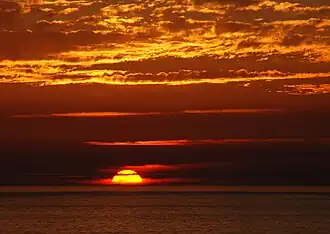 Sunset 2007-1
Sunset 2007-1 -
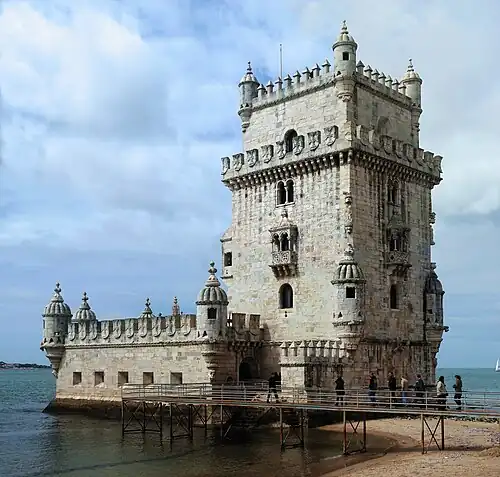 Torre Belém April 2009-4a
Torre Belém April 2009-4a
Former featured portals
In the News articles
 2010 Lisbon NATO summit
2010 Lisbon NATO summit 2015 European migrant crisis
2015 European migrant crisis 2021 Portuguese presidential election
2021 Portuguese presidential election 2024 Portuguese legislative election
2024 Portuguese legislative election 2025 Portuguese legislative election
2025 Portuguese legislative election José Manuel Barroso
José Manuel Barroso Bobi (dog)
Bobi (dog) Bullfighting
Bullfighting Celeste Caeiro
Celeste Caeiro Carlos do Carmo
Carlos do Carmo Otelo Saraiva de Carvalho
Otelo Saraiva de Carvalho Casa Pia child sexual abuse scandal
Casa Pia child sexual abuse scandal Lourdes Castro
Lourdes Castro Jorge Costa
Jorge Costa Sylvester da Cunha
Sylvester da Cunha Diogo Jota
Diogo Jota Euro area crisis
Euro area crisis Eurovision Song Contest 2018
Eurovision Song Contest 2018 Paulo Gonçalves (motorcyclist)
Paulo Gonçalves (motorcyclist) António Guterres
António Guterres 2025 Iberian Peninsula blackout
2025 Iberian Peninsula blackout June 2017 Portugal wildfires
June 2017 Portugal wildfires Hurricane Leslie (2018)
Hurricane Leslie (2018) 2010 Madeira floods and mudslides
2010 Madeira floods and mudslides Altino Pinto de Magalhães
Altino Pinto de Magalhães Guida Maria
Guida Maria Neanderthal
Neanderthal Manoel de Oliveira
Manoel de Oliveira Laxman Pai
Laxman Pai Manohar Parrikar
Manohar Parrikar 2022 Portuguese legislative election
2022 Portuguese legislative election Paula Rego
Paula Rego Same-sex marriage in Portugal
Same-sex marriage in Portugal Jorge Sampaio
Jorge Sampaio José Saramago
José Saramago André Silva (footballer, born 2000)
André Silva (footballer, born 2000) José Sócrates
José Sócrates 2021 UEFA Champions League final
2021 UEFA Champions League final
Main page featured articles
- 1755 Lisbon earthquake
- 2005 Azores subtropical storm
- Battle of Albuera
- Allosaurus
- Battle of Aljubarrota
- Bullfighting
- Pedro Álvares Cabral
- FC Porto in international football
- First Punic War
- Flag of Portugal
- Battle of the Gebora
- History of Portugal (1777–1834)
- Hurricane Leslie (2018)
- Madeira firecrest
- Ferdinand Magellan
- Princess Maria Amélia of Brazil
- Mercenary War
- Mozambican War of Independence
- Pedro I of Brazil
- Portuguese language
- Palace of Queluz
- Rhodesian mission in Lisbon
- Second Punic War
- War of the Spanish Succession
- Trocaz pigeon
Picture of the day pictures
-
 Alcobaça October 2021-1
Alcobaça October 2021-1 -
.jpg) Amalia Rodrigues, Bestanddeelnr 922-1813 (cropped)
Amalia Rodrigues, Bestanddeelnr 922-1813 (cropped) -
%252C_Parque_natural_de_la_Arr%C3%A1bida%252C_Portugal%252C_2020-07-21%252C_DD_07.jpg) Anémona de mar común (Anemonia viridis), Parque natural de la Arrábida, Portugal, 2020-07-21, DD 07
Anémona de mar común (Anemonia viridis), Parque natural de la Arrábida, Portugal, 2020-07-21, DD 07 -
 Argiope July 2012-3
Argiope July 2012-3 -
 Azulejos Parque Eduardo VII-2
Azulejos Parque Eduardo VII-2 -
 Batalha September 2021-2
Batalha September 2021-2 -
 Campilhas March 2015-1a
Campilhas March 2015-1a -
.jpg) Carmen Miranda in That Night in Rio (1941)
Carmen Miranda in That Night in Rio (1941) -
 CastleSaintGeorge
CastleSaintGeorge -
 Dragonfly Porto Covo August 2021-4
Dragonfly Porto Covo August 2021-4 -
%252C_Madeira%252C_Portugal%252C_2019-05-31%252C_DD_40.jpg) Erizo de mar violáceo (Sphaerechinus granularis), Madeira, Portugal, 2019-05-31, DD 40
Erizo de mar violáceo (Sphaerechinus granularis), Madeira, Portugal, 2019-05-31, DD 40 -
%252C_Parque_natural_de_la_Arr%C3%A1bida%252C_Portugal%252C_2020-07-23%252C_DD_43.jpg) Espirógrafo (Bispira volutacornis), Parque natural de la Arrábida, Portugal, 2020-07-23, DD 43
Espirógrafo (Bispira volutacornis), Parque natural de la Arrábida, Portugal, 2020-07-23, DD 43 -
%252C_Parque_natural_de_la_Arr%C3%A1bida%252C_Portugal%252C_2020-07-23%252C_DD_70.jpg) Espirógrafo (Sabella spallanzanii), Parque natural de la Arrábida, Portugal, 2020-07-23, DD 70
Espirógrafo (Sabella spallanzanii), Parque natural de la Arrábida, Portugal, 2020-07-23, DD 70 -
%252C_Parque_natural_de_la_Arr%C3%A1bida%252C_Portugal%252C_2020-07-31%252C_DD_79.jpg) Estrella roja del Mediterráneo (Echinaster sepositus), Parque natural de la Arrábida, Portugal, 2020-07-31, DD 79
Estrella roja del Mediterráneo (Echinaster sepositus), Parque natural de la Arrábida, Portugal, 2020-07-31, DD 79 -
%252C_Madeira%252C_Portugal%252C_2019-05-31%252C_DD_45.jpg) Gusano de fuego (Hermodice carunculata), Madeira, Portugal, 2019-05-31, DD 45
Gusano de fuego (Hermodice carunculata), Madeira, Portugal, 2019-05-31, DD 45 -
 Iberian Peninsula antique map
Iberian Peninsula antique map -
Iglesia de San Ildefonso, Oporto, Portugal, 2012-05-09, DD 01
-
 Lagoa do Capitão com montanha do pico
Lagoa do Capitão com montanha do pico -
_male_underside.jpg) Lang's short tail blue (Leptotes pirithous) male underside
Lang's short tail blue (Leptotes pirithous) male underside -
 LuzLissabon
LuzLissabon -
.jpg) Marcelo Rebelo de Sousa (Web Summit)
Marcelo Rebelo de Sousa (Web Summit) -
_-_Google_Cultural_Institute.jpg) Maria I, Queen of Portugal - Giuseppe Troni, atribuído (Turim, 1739-Lisboa, 1810) - Google Cultural Institute
Maria I, Queen of Portugal - Giuseppe Troni, atribuído (Turim, 1739-Lisboa, 1810) - Google Cultural Institute -
 Maria Isabel of Portugal in front of the Prado in 1829 by Bernardo López y piquer
Maria Isabel of Portugal in front of the Prado in 1829 by Bernardo López y piquer -
.jpg) POR-4-Imperial Treasury-2400 Reis (1798-99)
POR-4-Imperial Treasury-2400 Reis (1798-99) -
%252C_Parque_natural_de_la_Arr%C3%A1bida%252C_Portugal%252C_2020-07-23%252C_DD_24.jpg) Pez ballesta (Balistes capriscus), Parque natural de la Arrábida, Portugal, 2020-07-23, DD 24
Pez ballesta (Balistes capriscus), Parque natural de la Arrábida, Portugal, 2020-07-23, DD 24 -
 Philip IV of Spain - Velázquez 1644
Philip IV of Spain - Velázquez 1644 -
 Porto Covo pano April 2009-4
Porto Covo pano April 2009-4 -
 Porto3flat-cc-contr-oliv1002 edit2
Porto3flat-cc-contr-oliv1002 edit2 -
 Portugal 1729 8 Escudos
Portugal 1729 8 Escudos -
Puente Don Luis I, Oporto, Portugal, 2012-05-09, DD 13
-
%252C_Parque_natural_de_la_Arr%C3%A1bida%252C_Portugal%252C_2020-07-21%252C_DD_59.jpg) Salmonete de roca (Mullus surmuletus), Parque natural de la Arrábida, Portugal, 2020-07-21, DD 59
Salmonete de roca (Mullus surmuletus), Parque natural de la Arrábida, Portugal, 2020-07-21, DD 59 -
%252C_Parque_natural_de_la_Arr%C3%A1bida%252C_Portugal%252C_2020-07-21%252C_DD_62.jpg) Sepia común (Sepia officinalis), Parque natural de la Arrábida, Portugal, 2020-07-21, DD 62
Sepia común (Sepia officinalis), Parque natural de la Arrábida, Portugal, 2020-07-21, DD 62 -
 Sintra Portugal Palácio da Pena-01
Sintra Portugal Palácio da Pena-01 -
 Sunset 2007-1
Sunset 2007-1 -
 Torre Belém April 2009-4a
Torre Belém April 2009-4a
Featured topics
 Mercenary War
Mercenary War
New articles
Rules | Match log | Results page (for watching) | Last updated: 2025-08-20 20:40 (UTC)
Note: The list display can now be customized by each user. See List display personalization for details.
- Left Bloc (edit | talk | history | links | watch | logs | tools) by Agent VII (talk · contribs · new pages (71)) started on 2025-08-20, score: 150
- Keven Gomes (edit | talk | history | links | watch | logs | tools) by BiggySmoov (talk · contribs · new pages (19)) started on 2025-08-20, score: 40
- Cristiano Cruz (edit | talk | history | links | watch | logs | tools) by Roundtheworld (talk · contribs · new pages (5)) started on 2025-08-19, score: 110
- EuroBasket 2025 squads (edit | talk | history | links | watch | logs | tools) by Zdremon (talk · contribs · new pages (1)) started on 2025-08-06, score: 30
- Cottinelli Telmo (edit | talk | history | links | watch | logs | tools) by Roundtheworld (talk · contribs · new pages (5)) started on 2025-08-18, score: 120
- 2025 Men's European U-18 Water Polo Championship Division I (edit | talk | history | links | watch | logs | tools) by Maiō T. (talk · contribs · new pages (15)) started on 2025-08-18, score: 30
- Antena 1 Açores (edit | talk | history | links | watch | logs | tools) by RandomMe98 (talk · contribs · new pages (20)) started on 2025-08-18, score: 70
- João Barreiras Duarte (edit | talk | history | links | watch | logs | tools) by Moondragon21 (talk · contribs · new pages (207)) started on 2025-08-18, score: 70
- Pau Martí (cyclist) (edit | talk | history | links | watch | logs | tools) by Seacactus 13 (talk · contribs · new pages (21)) started on 2025-08-17, score: 30
- Marcelo Rotti (edit | talk | history | links | watch | logs | tools) by RafitaElias23 (talk · contribs · new pages (4)) started on 2025-08-17, score: 40
- António Juliasse Ferreira Sandramo (edit | talk | history | links | watch | logs | tools) by SiniyaEdita (talk · contribs · new pages (10)) started on 2025-08-17, score: 40
- 2025–26 Liga 3 (Portugal) (edit | talk | history | links | watch | logs | tools) by 2600:1700:9280:A660:B11D:B762:9EA8:FB22 (talk · contribs · new pages (1)) started on 2025-08-16, score: 100
- Porfírio Pardal Monteiro (edit | talk | history | links | watch | logs | tools) by Roundtheworld (talk · contribs · new pages (5)) started on 2025-08-16, score: 150
- A Herança (edit | talk | history | links | watch | logs | tools) by IAlex2004 (talk · contribs · new pages (1)) started on 2025-08-15, score: 40
- Ibnu Wahyutomo (edit | talk | history | links | watch | logs | tools) by Jeromi Mikhael (talk · contribs · new pages (21)) started on 2025-08-15, score: 30
- Keyan Varela (edit | talk | history | links | watch | logs | tools) by Ortizesp (talk · contribs · new pages (146)) started on 2025-08-15, score: 50
- ARTV (Portuguese TV channel) (edit | talk | history | links | watch | logs | tools) by Laterthanyouthink (talk · contribs · new pages (53)) started on 2025-08-15, score: 80
- List of international prime ministerial trips made by Tony Blair (edit | talk | history | links | watch | logs | tools) by StevoLaker (talk · contribs · new pages (2)) started on 2025-08-15, score: 60
- Iberian Revolutionary Liberation Directorate (edit | talk | history | links | watch | logs | tools) by The Blue Rider (talk · contribs · new pages (1)) started on 2025-08-15, score: 30
- Carlos de São Vicente (edit | talk | history | links | watch | logs | tools) by DarthCloakedGuy (talk · contribs · new pages (17)) started on 2025-08-13, score: 30
- Index of ancient Rome–related articles (edit | talk | history | links | watch | logs | tools) by The Transhumanist (talk · contribs · new pages (10)) started on 2025-08-14, score: 30
- Portugal properties scandal (edit | talk | history | links | watch | logs | tools) by Ainty Painty (talk · contribs · new pages (9)) started on 2025-08-14, score: 40
- Hélder Amaral (edit | talk | history | links | watch | logs | tools) by JohnyOda (talk · contribs · new pages (2)) started on 2025-08-13, score: 100
- 2025 Viseu local election (edit | talk | history | links | watch | logs | tools) by JohnyOda (talk · contribs · new pages (2)) started on 2025-08-12, score: 60
- Jordi Escobar (edit | talk | history | links | watch | logs | tools) by BrazilianDude70 (talk · contribs · new pages (87)) started on 2025-08-12, score: 30
- Abortion in Mozambique (edit | talk | history | links | watch | logs | tools) by Vigilantcosmicpenguin (talk · contribs · new pages (3)) started on 2025-08-09, score: 30
- Alcântara Maritime Terminal (edit | talk | history | links | watch | logs | tools) by Roundtheworld (talk · contribs · new pages (5)) started on 2025-08-11, score: 100
- Portugal at the 2025 World Aquatics Championships (edit | talk | history | links | watch | logs | tools) by WildCherry06 (talk · contribs · new pages (73)) started on 2025-08-11, score: 60
- Rui Cardoso (politician) (edit | talk | history | links | watch | logs | tools) by Cilidus (talk · contribs · new pages (185)) started on 2025-08-10, score: 60
- Malay-Acehnese conflicts (edit | talk | history | links | watch | logs | tools) by OwlCityzen (talk · contribs · new pages (1)) started on 2025-08-10, score: 40
- Mário Júlio de Almeida Costa (edit | talk | history | links | watch | logs | tools) by Jmanlucas (talk · contribs · new pages (34)) started on 2025-08-09, score: 60
- Pedro Afonso (sprinter) (edit | talk | history | links | watch | logs | tools) by Hildreth gazzard (talk · contribs · new pages (156)) started on 2025-07-29, score: 60
- Grasa Tour (edit | talk | history | links | watch | logs | tools) by Editedit446 (talk · contribs · new pages (1)) started on 2025-08-09, score: 30
- Portual women's national beach soccer team (edit | talk | history | links | watch | logs | tools) by Jerome Puno (talk · contribs · new pages (32)) started on 2025-08-09, score: 50
- Portugal women's national softball team (edit | talk | history | links | watch | logs | tools) by Jerome Puno (talk · contribs · new pages (32)) started on 2025-08-09, score: 40
- Noah Monteiro (edit | talk | history | links | watch | logs | tools) by Road Atlanta Turn 5 (talk · contribs · new pages (18)) started on 2025-08-06, score: 80
- Txillo (edit | talk | history | links | watch | logs | tools) by RandomMe98 (talk · contribs · new pages (20)) started on 2025-08-08, score: 60
- Blast (African TV channel) (edit | talk | history | links | watch | logs | tools) by RandomMe98 (talk · contribs · new pages (20)) started on 2025-08-08, score: 60
- Bruno Savate (edit | talk | history | links | watch | logs | tools) by Luis7M (talk · contribs · new pages (13)) started on 2025-08-07, score: 40
- NOS Studios (edit | talk | history | links | watch | logs | tools) by RandomMe98 (talk · contribs · new pages (20)) started on 2025-08-07, score: 60
- Manuel Gustavo Bordalo Pinheiro (edit | talk | history | links | watch | logs | tools) by Roundtheworld (talk · contribs · new pages (5)) started on 2025-08-06, score: 60
Things you can do
 |
Here are some tasks awaiting attention:
|
Related Portals
Related WikiProjects
|
Associated Wikimedia
The following Wikimedia Foundation sister projects provide more on this subject:
-
Commons
Free media repository -
Wikibooks
Free textbooks and manuals -
Wikidata
Free knowledge base -
Wikinews
Free-content news -
Wikiquote
Collection of quotations -
Wikisource
Free-content library -
Wikiversity
Free learning tools -
Wikivoyage
Free travel guide -
Wiktionary
Dictionary and thesaurus
-
 List of all portals
List of all portals -

-

-

-
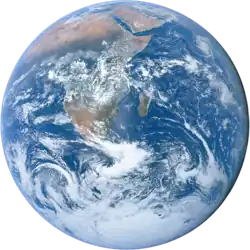
-

-

-

-

-

-
 Random portal
Random portal -
 WikiProject Portals
WikiProject Portals



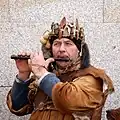
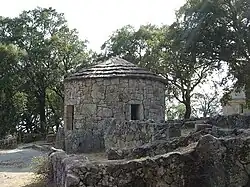
.jpg)
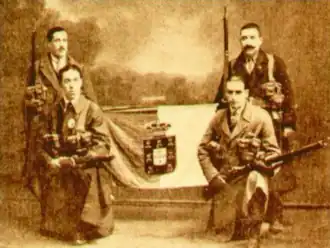
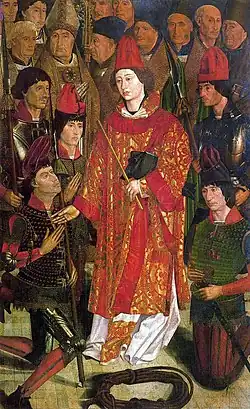


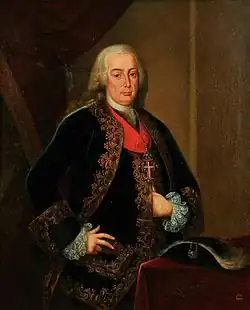

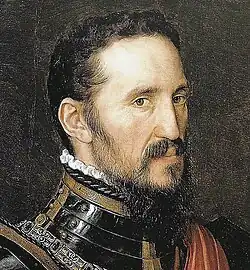
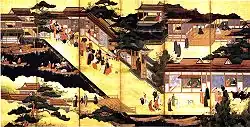
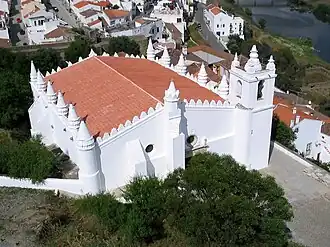
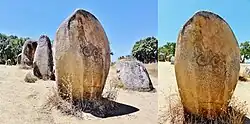

![Image 19Maios celebration in Madeira island [1] (from Culture of Portugal)](./_assets_/2011-03-05_03-13_Madeira_045_Santana_(5543431418).jpg)


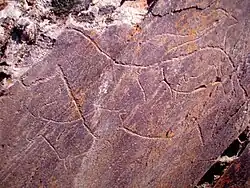
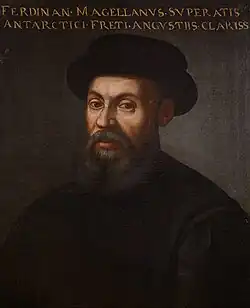

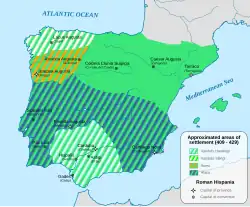

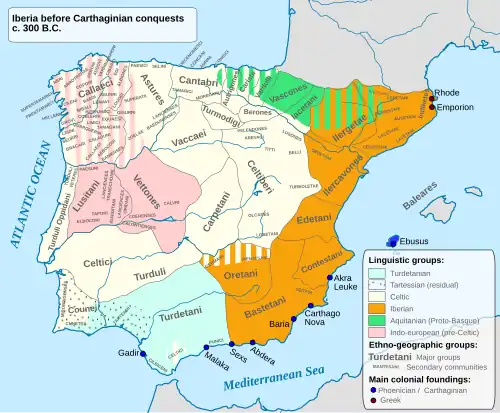

.png)
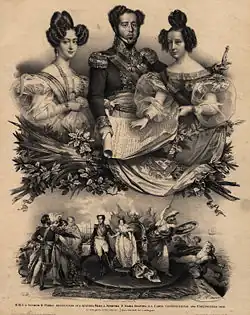
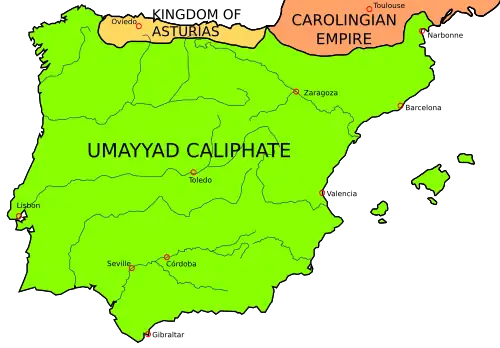


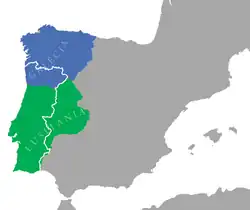
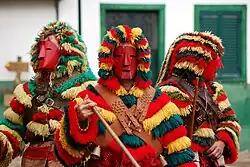

.png)
.jpg)

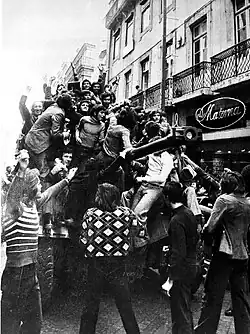
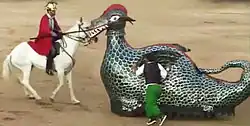
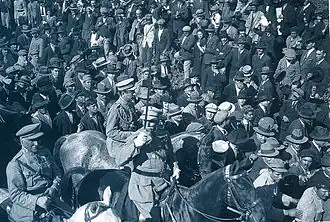
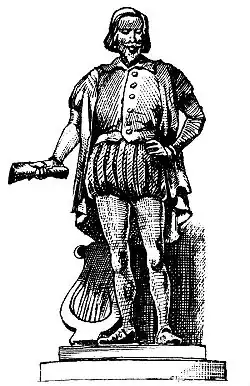

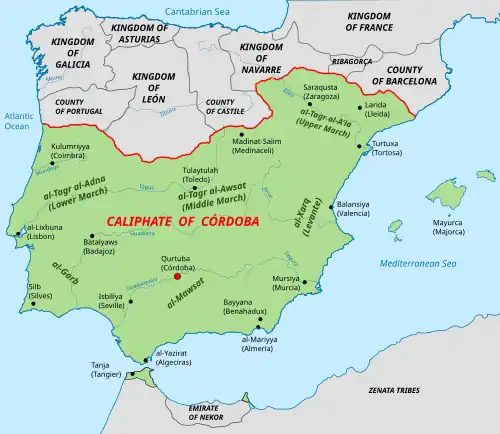
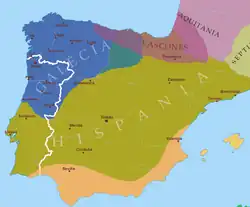
.jpg)
